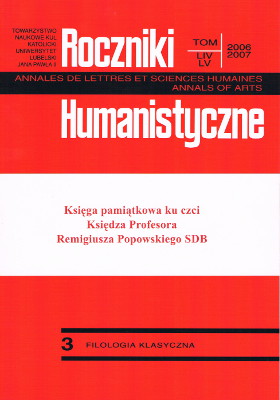“The Wise Adviser”. The Structural and Genetic Analysis of the Narrative Plot in the Histories of Herodotus
Abstract
The article consists of three parts: the first which illustrates the particular structure of the plot stated in the title, the second which explains the origin of the structure of the plot and the third which summarizes the whole content.
In the first part, after analyzing 26 examples of the plot taken from Herodotus’ Histories, it is possible to sketch the structural pattern of “the wise adviser” plot. It depicts the so-called patterns of history that are executed in the characters and events within the narrative. Moreover, those patterns are characteristic of the Herodotean narrative as such. They can bring to mind the technique of “ring-composition” discerned in the Homeric poems the Iliad and the Odyssey and also in the Histories of Herodotus.
The second part of the article concentrates on the origin of the structure of “the wise adviser” plot. That is, it attempts to give the answer on the question of how and why the plot was moulded the way it was. This problem is explained by the Havelock’s “oral rules” applied to the oral work and composition and also by the Ong’s “memory rules”. On their basis it is allowed to name the Herodotean narrative as the “oral narrative” that meets the expectations of the oral communication in the strict narrative genre.
The third part summarizes the preceding parts and draws some conclusions.
References
Beck I.: Die Ringkomposition bei Herodot und ihre Bedeutung für die Beweistechnik, Hildesheim 1971.
Bischoff H.: Der Warner bei Herodot, Marburg 1932.
Flory S.: Who Read Herodotus’ Histories, „American Journal of Philology” 101 (1980), s. 12-28.
Havelock E. A.: The Muse Learns to Write-Reflections on Orality and Literacy from Antiquity to the Present, New Haven–London 1986.
Havelock E. A.: Ustność Sokratesa i pisemność Platona: kilka refleksji nad historycznymi źródłami filozofii moralnej w Europie, przeł. P. Domański, „Studia Antyczne i Mediewistyczne” 1 [36] (2003), s. 43-59.
Immerwahr H.: Historical Action in Herodotus, „Transactions and Proceedings of the American Philological Association” 85 (1954), s. 16-45.
Immerwahr H.: Form and Thought in Herodotus, Cleveland 1966.
Jakoby F.: Die Fragmente der griechischen Historiker, t. I, Berlin 1923.
Johnson W. A.: Oral Performance and the Composition of Herodotus’ Histories, „Greek, Roman and Byzantine Studies” 35 (1994), nr 3, s. 229-254.
Lattimore R.: The Wise Adviser in Herodotus, „Classical Philology” 34 (1939), s. 24-35.
Mandler J. M.: Opowiadania, skrypty i sceny: aspekty teorii schematów, przeł. M. Cierpisz, Kraków 2004.
Norden E.: Agnosthos Theos. Untersuchungen zur Formgeschichte der religiösen Rede, Leipzig 1956.
Ong W. J.: Oralność i piśmienność-słowo poddane technologii, przeł. i wstępem opatrzył J. Japola, Lublin 1992.
Otterlo W. W. A. van: Untersuchungen über Begriff, Anwendung und Entstehung der griechischen Ringkomposition, Amsterdam 1944. Mededeelingen der Nederlandsche Akademie van Weteschappen, Afdeeling Letterkunde
Otterlo W. W. A. van: De ringcompositie als opbouwprincipe in de epische gedichten van Homerus, Amsterdam 1948. Verhandelingen der Koninkl. Nederlandsche Akademie van Wetenschappen, Afdeeling Letterkunde.
Pelling C. B. R.: Thucydides’ Archidamus and Herodotus’ Artabanus, [w:] Georgica: Greek Studies in Honour of George Cawkwell, edd. M. A. Flower, M. Token, (BICS Supplement 58), London 1991, s. 120-142.
Podbielski H.: Homer, [w:] Literatura Grecji starożytnej, t. 1: Epika – liryka – dramat, Lublin: TN KUL 2005, s. 67-155.
Powell J. E.: The History of Herodotus, Cambridge 1939.
Shapir o S. O.: Learning through Suffering: Human Wisdom in Herodotus, „Classical Journal” 89 (1994), s. 349-355.
Shapir o S. O.: Proverbial Wisdom in Herodotus, „Transactions of the American Philological Association” 130 (2000), s. 89-118.
Sławiński J.: Dzieło. Język. Tradycja, Warszawa 1974.
Stahl H. P.: Learning through Suffering? Croesus’ Conversations in the History of Herodotus, „Yale Classical Studies” 24 (1975), s. 1-36.
Copyright (c) 2007 Roczniki Humanistyczne

This work is licensed under a Creative Commons Attribution-NonCommercial-NoDerivatives 4.0 International License.





